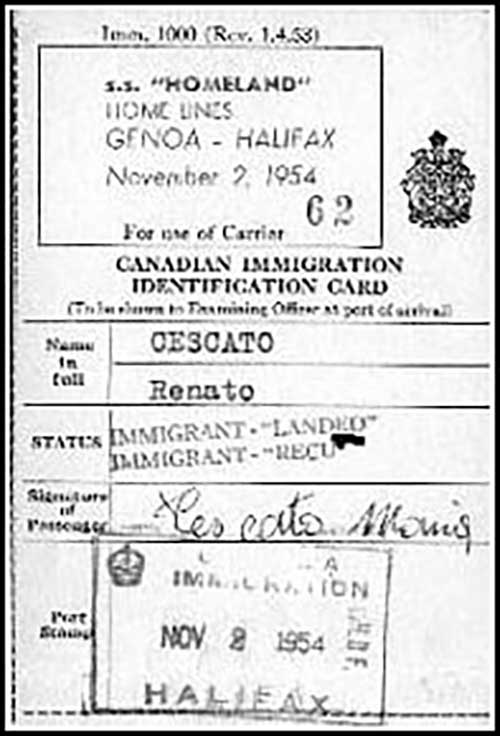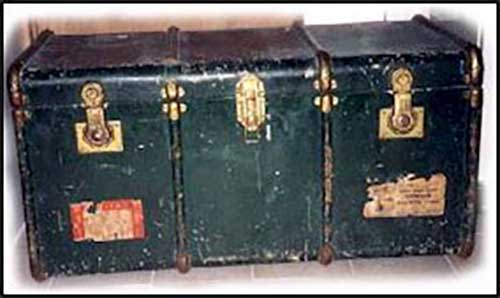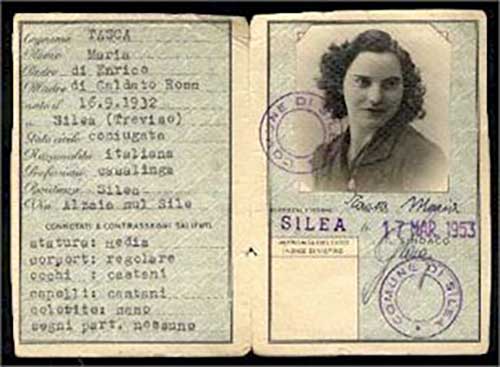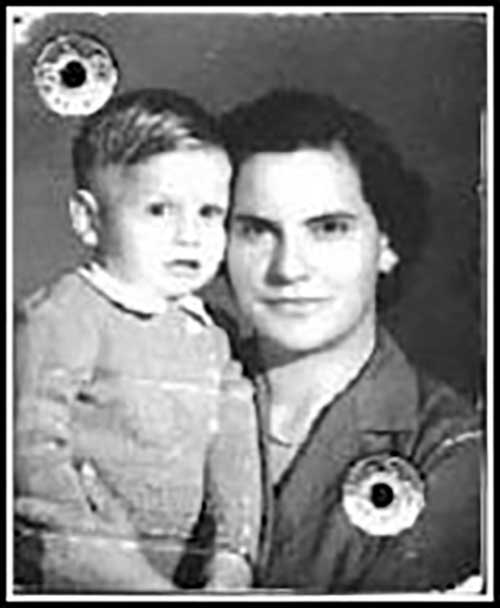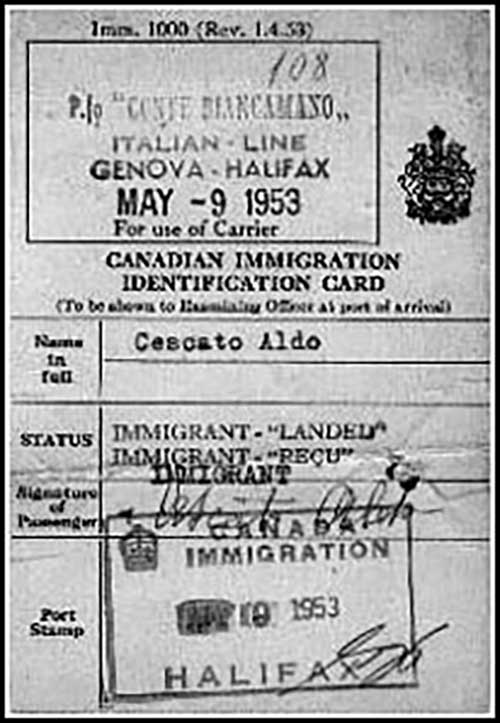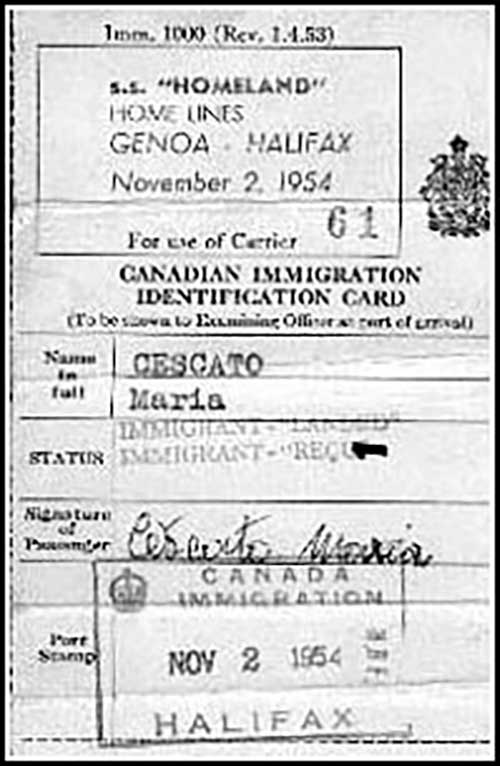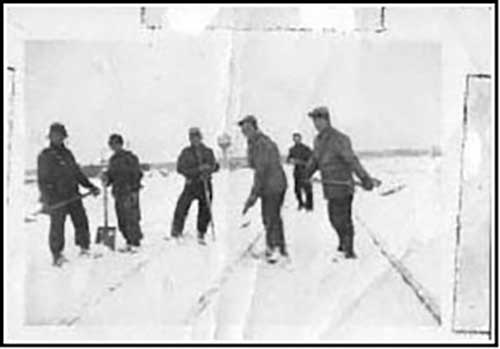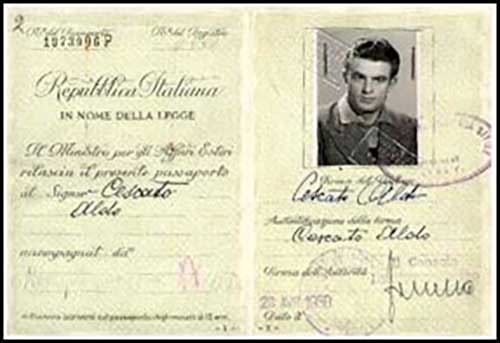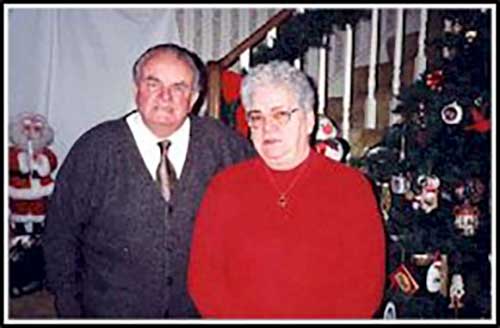Sobey Wall of Honour
Column
21
Row
13
Skip to Maria's Story
Aldo Cescato
My life as an immigrant began a few years after the second world war when I was 23 years old. I had been born and raised in the Veneto region of Italy, a region found in the Northern part of Italy that has always been an agricultural region up until the 1960's. After that time there was an industrial development and many farmers abandoned the land to work in factories and offices.
From 1945 to 1948 there was a little work in cities like Treviso and Mestre rebuilding all that had been destroyed by the bombarding during the war. At that point young men began preparing their suitcases to leave for work as migrants in France where they would stay until they were caught and returned to Italy since the two countries did not have a work treaty. The first work treaties were made with Belgium for work in the coal mines, with France for work in the steel and coal mines and with Switzerland for seasonal work. Later Switzerland began to look for construction and rail workers. At that time many also went to South America (Argentina, Brazil, Venezuela) to work in construction.
In the spring of 1949 France was looking for workers for a steel mill in Alsace Lorraine and I applied for a job. The representatives from the mill checked our hands and our arms to make sure we had the muscles required for the heavy work. After passing the medical a group of 150 men from Treviso left in May for Milan where we were subjected to another medical exam. Then we left directly for the city of Tulle in France. I stayed in France for nearly two years, the work wasn't too bad, but the people in the town did not like us since we had been on opposite sides of the war.
I came back to Italy in 1951 and in June I married Maria. Job prospects were still bad, in order to get a good job with the railroad or the government you had to know someone and be willing to pay. I decided to apply for a job in Belgium in the coal mines, so I left for Milan to have the customary medical exams. I failed the medical exam and was told to retry in two weeks, but I failed the medical exam again and went home.
I went home and worked off and on until January 1953. Reading the local newspaper (Ill Gazettino di Treviso) I read an article about Canada looking for rail workers. So I went to the local office, signed up and began the medical exams. In March they invited me to go to Milan with my wife and son for additional medical exams performed by Canadian doctors. Even though I was the only one immigrating at the time, they wanted to ensure that my wife and son were also in good health, since they would surely follow later. In 1953 the population in Canada was 8 million people and Canada was looking to increase their population.
Finally the papers arrived for my departure and one Saturday morning a representative from the rail road showed up at my home and informed my wife that I should present myself to the office on Sunday with 70,000 lire to pay a part of my fare. The rest of the fare would be deducted from my pay in Canada. I already knew they would be asking for some of the fare but since my wife didn't and she knew we had no money she told the representative she didn't think I could raise the money. When I got home I quickly began to try and raise the 70,000 lire. With the financial help of my mother and my father-in-law I raised the money and showed up with my suitcase and the 70,000 lire on Sunday at the office. The rail representative had given away my spot on the ship thinking I could not raise the needed money and so he told me to return on April 27th when another ship would be leaving. So I returned to my home with my suitcase to wait again. It was the third time I had returned home after having said goodbye to my family thinking I would be leaving (twice to Belgium and once to Canada).
Finally on April 27th without saying goodbye to family and friends again I left for Genoa. On April 30th, early in the morning, we boarded the ship and at 11:00 the ship left port for Naples and Palermo. The ship was called the "Conte Biancamano" and had about 1,100 of us from Treviso and Friuli, very few with wives and children. Some of those on the ship had already been to Argentina but since life there wasn't much better than Italy, they thought they'd try their luck with Canada.
I had made a friend before leaving on the ship, a man who came from a town near mine and was poor like me. In Genoa I bought a mirror to shave with and was left with 5 lire in my pocket. After the ship left the port my friend and I went to the dining room. We were greeted with a table full of steaming pesto risotto with very few people in the dining room since they were all out at the rail watching the ship leave the port. We ate heartily and at the end of the meal there were two full carafes of wine left at our table, since our table consisted of 4 men 2 women and 6 children. The waiter at our table was a man from Trieste and when we told him we had no money he brought us two empty bottles so that we could empty the carafes and bring the wine back to our room. We passed the days walking the decks of the ship and one morning we spotted the coastline of Canada. It was the 9th of May at around 9:00 in the morning when the ship docked in Halifax, a very foggy morning. Around 10:00 they let us debark and we were led into Pier 21.
Before I left the ship I took the 5 lire I had left in my pocket and placed it in a flower vase on the ship. I wanted to land in this country penniless and start from there. In the Pier 21 warehouse there were representatives from the rail company R.F Welch that was located in Port Arthur. 70 of us were picked to start work in Wasaga Beach. The representative gave each of us an advance of $18.10 and told us to buy some food for the train trip. That evening we boarded the train for the 2 day, 1 night trip. We stopped in Toronto on May 11 at about 7:00 am.
The representative accompanying us told us not to speak to anyone in Union Station, since there were many other contractors looking for workers and they feared we would leave. They whisked us away to the station restaurant and we got our first Canadian meal: eggs, bacon, toast, jam and coffee. We were starving since when we had brought food in Halifax, we had bought jam, cheese and bread. The bread was not to my liking since it was soft. Also we had bought a bottle that had a picture of grapes on it, assuming it was wine, but it turned out to be grape juice.
After breakfast, at 10:00 am they put us on a train for Wasaga Beach where we arrived at about 1:00pm. They showed us the 10 rail cars which would be our home from now on. One car was the kitchen, one the dining car, one held a cistern of water, one was full of work tools and 6 cars were sleeping cars (each car sleeping 12 people). As soon as we arrived we were sent to the dining car to eat. The table had dishes with desserts on them and in our hunger we devoured the desserts. When the waiter arrived with our soup he told us that we didn't have to worry about food here, that we would be well fed. After lunch we were consigned blankets and sheets and advised that work began at 7:00am and that we would work 10 hours a day, 6 days a week. The pay was 90 cents per hour, and room a board of $2.40 per day would be deducted from our pay. In other words, 3 hours of work a day went to paying for room and board.
That afternoon a group of us starting walking around town just looking about. There were few people living in the area back then and we were curious to see these small homes in the middle of the forest. Most of them were close to the water and appeared uninhabited. Later it was explained to us that these were cottages belonging to people who worked elsewhere and only came here on weekends. So on May 12th I started my first day of work in Canada repairing rail tracks. Every few weeks we moved further north in Ontario. During the winter we were responsible for clearing the tracks of snow and went as far north as Nipigon.
Many did not respect the terms of our contract which was for one year, and left to go to Toronto, Hamilton or Montreal where they had relatives. They did however always repay their ship fare and simply left because the pay in the cities was much better. When my friend and I received our first paycheck we decided to send the money to Italy where we had left loved ones and debts. We found the address for the Royal Bank in Toronto and sent them the money with an address of where to forward it. After a few months it was clear that the money was not getting to Italy, so when the rail representative came to town we explained what we had done. When he went to Toronto he found our money still sitting in the Royal Bank since no one in the bank understood Italian and therefore could not carry out our wishes. The representative then arranged for us to forward subsequent money to the Bank of Commerce in Port Arthur. From then on my wife received regular money from me and was able to pay off our debts.
During the summer many left for Toronto to search of better paying work but then when the winter come many construction companies sat idle because of the cold. Those who had left the rail company tried to collect unemployment insurance in the winter but were denied but they had failed to live up to their rail contracts for the full year. Since my friend and I had families back home to support we did not leave the rail work until our contract was up. That winter was very hard and many days we couldn't work for more than 9 hours but with some sacrifice we finally made it to the spring of 1954.
By March of that year there were not many men left from the original group who came to the rail work. We were supposed to travel to Stratford via Toronto and so my friend and I decided that on March 19th when the train came through Toronto we would leave to find work in Toronto. We had already been writing to fiends in Toronto and so on the feast day of St Joseph we arrived in Toronto. Construction work was not proceeding very quickly then but within a few days we found work with an Italian company. Then I started putting money in the bank so that I could request that my wife and son join me here.
At St Carmel's R.C. church in downtown Toronto, there was an organization that would help you fill out the necessary forms to request your family join you and to book their boat fare which could then be repaid over time. So on November 2nd 1954 my family arrived aboard the "Homeland" in Halifax. I worked very hard as a mason assistant and then learned the trade of bricklayer. In those times it was hard to rent a few rooms especially if you had children. We changed lodgings 4 times because the home owners needed the room for immigrating relatives or children who were marrying.
The first years in Canada were not easy ones. After only three months of his arrival, my son died of asthma before his 3rd birthday. In those years when it got very cold we could not work in the construction trade and often we were idle until April. Many years I collected the maximum amount of annual unemployment insurance and had to ask for the supplemental amount which was another 9 weeks worth.
In December 1955, precisely on Christmas day Nadia was born. In January of 1959 I became a Canadian citizen, and in that same year my wife gave birth to twin boys that did not live. In 1961 our daughter Anna was born and then in 1967 our son Paolo.
So it came that the last time we had to move from a rental property in the Spring of 1964 , bowing to my wife's insistence, we decided to buy a small house in the same area of the city where we had always lived. With $1,200 down and a $10,000 mortgage we finally had our very own home.
After graduating from grade 12, Nadia started working while Anna and Paolo attended university with government grants and our sacrifices. Anna graduated with a BA in Geography and a BA in Education, while Paolo graduated with a BA in Industrial Engineering. In 1968 we went to Italy for the first time since we left and brought our children to meet their relatives. After 10 years in 1978 we went again as a family. Since then I have gone back alone every 2 years and my wife and children have also traveled back separately. In 1998 I went back to celebrate the 100th birthday of my mother. In 1999, 2 months shy of her 101st birthday, my mother passed away.
With the passing of time Nadia bought a house like ours down the street from us. In 1971 I got my driver's license and bought a second hand car and began to explore lake country during the week ends. In 1988 my daughter Nadia and I decided to sell our two houses in Toronto and buy a newer bigger home in Mississauga. Today I am retired, I'm 73 years old but I have not worked in 20 years due to a back injury suffered on the job. I am fortunate to have my daughter Nadia living with me because she pays half the house expenses otherwise we could not afford to live here on the retirement income my wife and I receive.
Now I am happy to be living in Canada because this country gave me many possibilities that perhaps in Italy I would never have had. But I do miss my homeland and everyday I watch the local news on the Telelatino cable channel.
On June 30 1951, after a three year engagement, Aldo and I were married in my home town of Silea in the province of Treviso. It was a very small and simple wedding ceremony attended by relatives and a few friends, since we were very poor and it was not possible to do more. In the meantime my husband was unemployed because in those post war years there was little work in Italy. Most men had begun to look outside to countries where workers were needed and Aldo, after having tried unsuccessfully to immigrate to Belgium, left for Canada on April 27, 1953. I stayed in Italy with our 9 month old son Renato. We were waiting for my husband to finish his contract with the railroad so that he could move to Toronto. In Toronto he hoped to find work and a two room flat so that he could send for us to join him.
In the meantime, while I waited to join him, I continued to live with my parents and siblings in a three room house. In what would have been my matrimonial bedroom, I now shared a bedroom with my three sisters and my young son. A month had past since my husband's departure and having promised to send me a letter as soon as he arrived, I began to worry when none arrived. My parents feared he had deserted me and would not send for me. The first letter he sent had been stolen by the local postman, who removed the 5 dollars my husband had enclosed, and then eventually delivered the letter. I wrote and told my husband what had happened, but he sent 5 dollars in the second letter, which thankfully made it to me, and instructed me to buy a gold necklace for our son.
After 14 months apart he was finally able to begin the process of applying for our immigration to join him in Canada. It was very painful for my parents to think of me leaving. Like all parents they would gladly have given of their last piece of bread to keep their children close to them. Having always lived in a small town of 5,000 people and having rarely even traveled to the closest city, it seemed to them that my son and I would be traveling to the end of world. My parents were very simple people, my father could neither read nor write and my mother had only attended elementary school.
When Renato and I had to go Rome for the medical exam and to see the Canadian consul, there was hardly any money so we had to travel alone by train. After a long night we arrived at the train station in Piazza Cratti in Rome and since the Consulate was nearby, we walked. I was unfamiliar with the Canadian custom of addressing married women by their husband's last name. We were in a very large room, filled with women and children whose husband's had requested their immigration. They began to call for Maria Cescato and called several times before I realized they were referring to me, since I was not accustomed to being addressed this way.
I was escorted upstairs where I was asked several questions regarding why I wanted to go Canada and if I had family there. I explained to them that my husband had immigrated and that my son and I wished to join him. After the medical exam we were given our visa allowing us to immigrate. Once outside the consulate to celebrate our success, I found a fruit vendor and bought a huge bunch of white grapes that my son loved. Now that I knew that nothing would impede our leaving I watched him eat all the grapes and then after another long night on the train we returned home. When my parents heard the news that we were being allowed to go to Canada, my father was very pleased. My mother, on the other hand, cried desperately since she feared she would never see again. My mother saw me three more times before her death in 1989 but she never again saw my son.
So after suffering hunger in Italy, where life had become very difficult with little work or money and now married three years, after 17 months of separation I left to join my husband. On October 24th I boarded the ship "Homeland" on it's last voyage before being retired. The long ocean voyage took 9 days. I felt fine but my young son Renato was terribly sea sick. Since we were immigrants we were housed in the lower decks of the ship below the water and as such were never able to breath some fresh air. Early in the mornings the ship stewards would allow me up in the first class level to sit outside on the deck so that Renato could breath some fresh air and feel somewhat better. I was fortunate to befriend some passengers from Abruzzi and MonteBelluno would bring me some bread and hard boiled eggs since I could not go to the dining room, as the smell of food would make Renato ill. It's sad to recall that the waiters on the ship never even brought me a glass of water, since I was a lowly immigrant. I was not the only person sitting on the decks getting some air, as many passengers suffered from sea sickness. One day the ship's Captain came upon us and inquired where I was from. When I told him I was from Silea in the province of Treviso, he commented that those from Treviso ate radicchio and always felt well.
One day we heard that during the night as a result of very thick fog, we narrowly escaped hitting another ship. During that time there were many ships making the ocean crossing. I remember that the day we left Genoa I saw the ship "Andrea Doria" sitting in port and later in Canada I recall watching the ship sink on television. Finally after 9 days we arrived in Halifax and they brought all of us into a giant warehouse (Pier 21) where we were to clear customs. They checked all our trunks, suitcases and handbags. I had nothing to declare except a small salami I was carrying in my purse for my husband, since I did not know that transporting meat was illegal. What I saw that day was incredible. People had brought all kinds of things donated by families and friends. They started to build a mountain of the things they confiscated from the passengers; salami, bottles of olive oil, cans of tuna, etc. It seemed incredible comparing that huge pile to the small salami I was carrying. My parents could hardly have spared any more since they were even poorer than I.
I was sent to a small grocery store to buy some food to eat on the train. I was terribly confused since I did not recognize anything in the store and I could not speak English. Those who worked in the shop did not speak Italian and so in the end I bought a loaf of bread and some "Velveeta" cheese. The train trip lasted 2 days and 1 night with a change in Montreal . In Montreal I could not explain that I needed a washroom for my son and was forced to use charades to act out my request. My son was still feeling dizzy from the difficult voyage and it was a relief for him to use a washroom on solid ground.
Finally we arrived in Toronto, all along the train ride I had been concerned by the small buildings I had seen by the side of the tracks. I saw so much wood just lying about and I recalled how difficult it was for us back home to buy wood for our stoves and here there appeared to be an abundance of wood. At the train station I found my husband. My son had been only 9 months old when his father left and now he was 2½ years old, so he did not recognize his father. We went, along with 2 other couples, to eat lunch at the home of a friend my husband had made during his time in Toronto before we arrived. Later Aldo took us to a house where he had rented us two rooms. We lived there for two years with a wonderful family who was very kind to us. However, my suffering had just begun. After only 3 months in Canada in February, Renato died of asthma. I cannot describe the desperation I felt, that first year was very painful and sad, I thank God that I had the faith to continue. That Christmas day our daughter Nadia was born and I seemed to get my strength back and began to accustomize myself to this new life in Canada.
Again my life was touched with death when in 1959 I gave birth to a set of twin boys who died almost immediately. It was so hard for me since I always loved children and had hoped to have many of my own. We moved house since the owners now needed our rooms for relatives that were coming from Italy. We changed homes a few times and in 1961 our second daughter Anna was born and our family was happier and serene. Again the home owners asked us to leave to make room for their relatives and so we decided to buy our own house. I had grown tired of constantly moving and would have preferred moving back to Italy rather than renting again. So in 1967 we bought our first home and our son Paolo was born. Now my family was complete, and even though money was never plentiful, we were happy.
On my voyage to Canada I had brought two steamer trunks loaded with glass and china items. Everything was broken on the voyage except for several Christmas ornaments made of glass. We still adorn our Christmas tree with these special ornaments that date back to our first Christmas as a married couple in 1951. I also still have to two steamer trunks and actually wanted to donate one to the Pier 21 museum.
When I first arrived in Canada, I bought a second hand sewing machine for $21 and using old discarded clothes I made dressed for my daughters and I. In 1972 I finally became a Canadian citizen. We lived in that first house for 24 years and raised 3 children. In the meantime the children grew and studied and our oldest went to work and bought a house down the street from us with her savings. In 1989 we sold both houses and bought a larger home in Mississauga where we are currently living.
Our second daughter became a teacher and in 1983 married a Montreal native. They lived in Montreal for 4 years and then moved to Ontario where in 1997 they had a son, Sean, our first grandchild who brings us so much joy and pride. Our son graduated as an Industrial Engineer and in 1998 married an Italian girl who had immigrated to Canada at the age of two in 1967.
Now will live in Mississauga with our daughter Nadia and between our two senior's pensions and Nadia's income we live well. Even though our life in Canada has not always been easy, with much faith and hard work, today after 45 years I give thanks to this great nation for giving me the possibility of a better life, where we have never been hungry and where we were able to raise 3 children. Despite all the suffering we still consider ourselves to be fortunate and we thank all our friends we have helped us along the way and who still today remain our friends in times of pain and joy.
